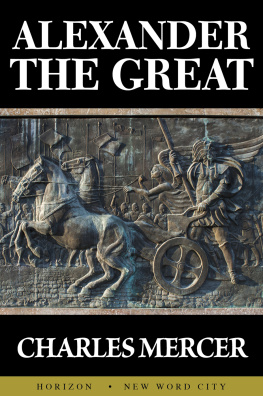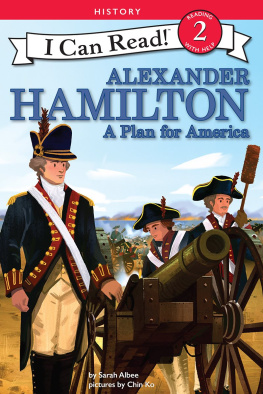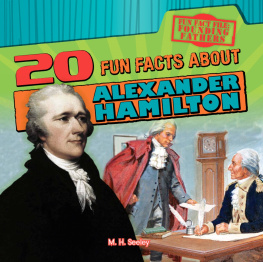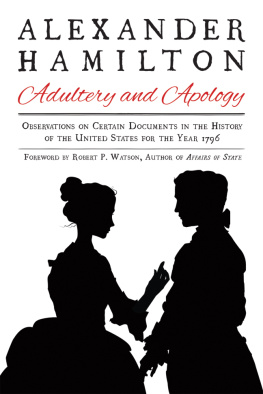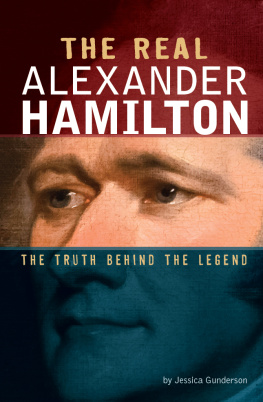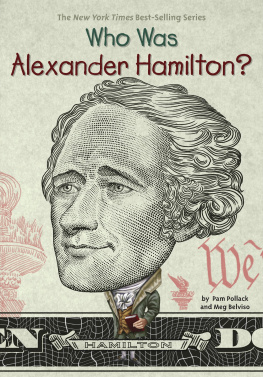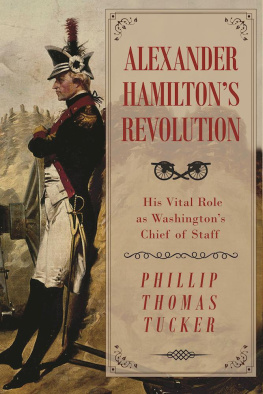I
YOUTH AND EARLY SERVICES
The life of Alexander Hamilton is an essential chapter in the story of the formation of the American Union. Hamilton's work was of that constructive sort which is vital for laying the foundations of new states. Whether the Union would have been formed under the Constitution and would have been consolidated into a powerful nation, instead of a loose confederation of sovereign states, without the great services of Hamilton, is one of those problems about which speculation is futile. It is certain that the conditions of the time presented a rare opportunity for such a man as Hamilton, and that without some directing and organizing genius like his, the consolidation of the Union must have been delayed, and have been accomplished with much travail.
The difference between the career of Hamilton in America and that of the two greatest organizing minds of other countriesCaesar and Napoleonmarks the difference between Anglo-Saxon political ideals and capacity for self-government and those of other races. Where the organization of a strong government degenerated in Rome and France into absolutism, it tended in America, under the directing genius of Hamilton, to place in the hands of the people a more powerful instrument for executing their own will. So powerful a weapon was thus created that Hamilton himself became alarmed when it was seized by the hands of Jefferson, Madison, and other democratic leaders as the instrument of democratic ideas, and those long strides were taken in the states and under the federal government which wiped out the distinctions between classes, abolished the relations of church and state, extended the suffrage, and made the government only the servant of the popular will.
The development of two principles marked the early history of the Republic, one, the growth of sentiment for the Union under the inspiration of Hamilton and the Federalist party; the other, the growth of the power of the masses, typified by the leadership of Jefferson and the Democratic party. These two tendencies, seemingly hostile in many of their aspects, waxed in strength together until they became the united and guiding principles of a new political order, a nation of giant strength whose power rests upon the will of all the people. It was the steady progress of these two principles in the heart of the American people which in "the fullness of time" made it possible for the Union to be preserved as a union of free men under a free constitution. To Hamilton, the creator of the machinery of the Union, and to John Marshall, the great Chief Justice, who interpreted the Constitution as Hamilton would have had him do, in favor of the powers of the Union, this result was largely due.
If Caesar, fighting the battles of Rome on the frontier of Germany, and kept from party quarrels at home, and Napoleon, born outside of France and free by his campaign in Egypt from the compromising intrigues of Parisian politics, were preminently fitted by these accidents to transmute the spirit of revolution from chaos into order, Hamilton stood in somewhat the same position in America. Born in the little island of Nevis in the West Indies (January 11, 1757), he came to the United States when his mind was already mature, in spite of his fifteen years. He came without the local prejudices or state pride which influenced so many of the Revolutionary leaders, and was therefore peculiarly qualified to fasten his eyes steadfastly upon the single end of the creation of a nation rather than the ascendency of any single state. He was so free from local attachments that he even hesitated at first on which side he should cast his lot, whether with the imperial government of Great Britain, which appealed strongly to his love of system and organized power, or with the struggling revolutionists, with their poor and undisciplined army and uncertain future. The possibility of winning distinction in the service of Great Britain must have attracted him, but the justice of the colonial cause spoke more strongly to his sense of right and his well-ordered mind.
The great services of Hamilton were nearly all performed before he was forty years of age. His precocity was partly derived from his birth in the tropics and partly, perhaps, from the unfortunate conditions of his early life. A mystery hangs over his birth and parentage, which repeated inquiries have failed to clear away. He is believed to have been the son of James Hamilton, a Scottish merchant of Nevis, and a lady of French Huguenot descent, the divorced wife of a Dane named Lavine. But the history of his parents and their marriage is shrouded in much obscurity. The father, although reduced to poverty, lived nearly if not quite as long as his illustrious son, but the mother was reported to have died while Hamilton was only a child, leaving the memory of her beauty and charm in one of the chambers of his infant mind. Hamilton sought in his later years to establish regular communication with his father, and he had a brother in the West Indies with whom he corresponded; but the fact that all these relatives remained so much in the background gave some color to the slanders of his enemies concerning his birth.
To offset the disadvantages of birth, Hamilton had neither the fascinating manners which go straight to the hearts of men, nor the imposing personal presence which in the orator often invests trifling platitudes with sonorous dignity. He was possessed of a light and well-made frame, and was erect and dignified in bearing, but was much below the average height. His friends were wont to call him "the little lion," because of the vigor and dignity of his speech. He had the advantage of a head finely shaped, large and symmetrical. His complexion was fair, his cheeks were rosy, and in spite of a rather large nose his face was considered handsome. His dark, deep-set eyes were lighted in debate with a fire which controlled great audiences and cowed his enemies. But it was chiefly the power of pure intellect which gave him control over the minds of other men. There was nothing mean or low in his character, but he had not a high opinion of the average of humanity, and therefore lacked somewhat in that ready sympathy with the minds of others which is so useful to politicians and party leaders.
Hamilton was early thrown upon his own resources. His father became a bankrupt, and he was cared for by his mother's relatives. His education was aided by the Rev. Hugh Knox, a Presbyterian clergyman, with whom Hamilton kept up an affectionate correspondence in later years. The boy was only thirteen years of age when he was placed in the office of Nicholas Cruger, a West Indian merchant. Here his self-reliance and methodical habits made him master of the business and head of the establishment when his employer had occasion to be away. His remarkable capacity, and his occasional writings for the daily press, led to a determination by his relatives and friends to send him to a wider field. He was accordingly supplied with funds and sent to Boston, where he arrived in October, 1772, still less than sixteen years of age. He was fortunately provided with some strong letters of recommendation from Dr. Knox, and was soon at a grammar school at Elizabethtown, N.J., where he made rapid progress. He desired to enter Princeton, but his project of going through the courses as rapidly as he could, without regard to the regular classes, was in conflict with the rules. He therefore turned to King's College, New York, now Columbia University, where he was able, with the aid of a private tutor, to pursue his studies in the manner he wished.




